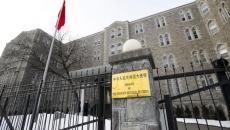EDMONTON - The Transportation Safety Board is calling for better screening of heart-related conditions of Canadian pilots.
The recommendation comes after at least eight fatal or serious plane crashes between the early 2000s and 2021 — all believed to be linked to heart attacks or cardiovascular diseases among pilots.
#TSB issues a new recommendation following the investigation report (A21W0089) into a fatal collision with terrain in Lacombe, AB. #TSBAir https://t.co/ANRk3uKKJX pic.twitter.com/sMa0jZKnSO
— TSB of Canada (@TSBCanada) March 14, 2023
In a report published Tuesday, the independent federal agency recommended the Department of Transport "establish a framework for routine review and improvement" of its guidelines "to ensure it contains the most effective screening tools for assessing medical conditions," including cardiovascular health issues.
The most recent crash happened in October 2021 in central Alberta when a pilot flying an amateur-built plane died.
An investigation into the crash in Lacombe, Alta., found evidence the pilot had a heart attack, but it was impossible to determine exactly when.
But this wasn't the first confirmed crash where cardiovascular disease was determined as a factor.
Jon Lee, western regional manager with the board, said that during the investigation into the 2021 crash, the team found that a safety issue related to heart-related wellness was raised with Transport Canada more than a decade ago.
The TSB raised the concern with Transport Canada after a 2010 crash in New Brunswick, noting the gaps between the diagnosis of cardiovascular diseases and that being communicated by physicians to the regulatory body.
Lee said the concern wasn't addressed at that time.
"When it surfaced again in (the 2021) occurrence, we felt that if we re-communicated the safety issue, we could get some more traction, and hopefully convinced the regulator to make a change," he said in an interview Tuesday.
That's why, Lee said, the report was elevated as a recommendation.
Transport Canada's aviation medical guidelines for cardiovascular diseases were last updated in 2012.
TSB has recommended that cardiovascular risk screening should be required for all pilots over the age of 40, and for those pilots identified to be at an increased risk based on their medical history.
As of October, 32,900 pilots in Canada hold medical certificates, qualifying them to fly planes. About half of them were over the age of 40, the report said.
The agency also suggested mandatory assessment of blood lipids in addition to other methods for screening coronary artery disease.
Lee said eight plane crashes are statistically "very low," but they still represent a risk to the transportation system.
"To the families involved with those people in those accidents, one is a big number," Lee added.
Of the eight crashes, two from 2010 and 2021 were proved to be directly linked to a pilot suffering from a heart attack while flying. The others were identified as a risk to the transportation system.
TSB also pointed out that many physicians aren't aware of their patients holding pilot licenses, which increases the chances of affecting "the safe operation of an aircraft."
The investigative agency reached out to Transport Canada earlier this year, encouraging it to work with the Canadian Medical Association and increase awareness of the reporting requirements for physicians.
While the investigative agency doesn't hold the authority to implement the suggestions, Lee said, he hopes the report brings some change.
"We'll evaluate (Transport Canada's) actions, and if the risk is being reduced by their action," he said. "If so, we will close off and recommendations as fully satisfactory. If not, then we'll continue to track (the risks) on an annual basis."






